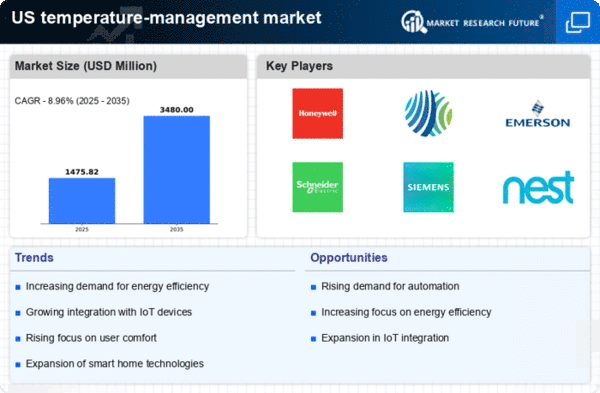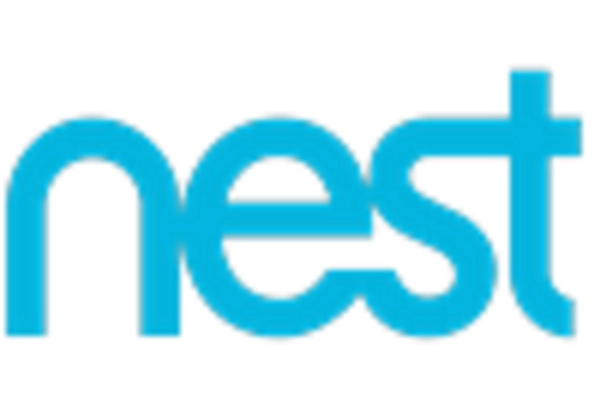Growing Demand for Smart Homes
The increasing trend towards smart homes is a pivotal driver for the smart temperature-management market. As consumers seek enhanced convenience and energy efficiency, the integration of smart temperature-management systems becomes essential. In 2025, it is estimated that over 30% of households in the US will have adopted smart home technologies, which includes advanced temperature control systems. This shift not only reflects a desire for comfort but also a growing awareness of energy consumption. The smart temperature-management market is poised to benefit significantly from this trend, as homeowners look for solutions that can be controlled remotely and provide real-time data on energy usage. Furthermore, the potential for cost savings through optimized heating and cooling systems adds to the appeal, making it a compelling choice for many consumers.
Consumer Awareness of Climate Change
The rising consumer awareness regarding climate change is a crucial driver for the smart temperature-management market. As individuals become more conscious of their environmental impact, there is a growing demand for solutions that promote sustainability. Surveys indicate that over 60% of US consumers are willing to invest in energy-efficient technologies to reduce their carbon footprint. This shift in consumer behavior is pushing the smart temperature-management market to innovate and provide solutions that align with eco-friendly practices. The emphasis on reducing energy consumption not only benefits the environment but also leads to cost savings for consumers, making smart temperature-management systems an attractive option.
Technological Advancements in Sensors
Technological advancements in sensor technology are significantly influencing the smart temperature-management market. The development of more accurate and cost-effective sensors allows for better monitoring and control of temperature settings in residential and commercial spaces. In 2025, it is projected that the market for smart sensors will reach $10 billion in the US, with a substantial portion dedicated to temperature management applications. These innovations enable systems to learn user preferences and adjust settings automatically, enhancing user experience and energy efficiency. The smart temperature-management market is likely to see increased adoption as these technologies become more accessible and affordable, driving further growth in the sector.
Regulatory Support for Energy Efficiency
Regulatory frameworks in the US are increasingly favoring energy-efficient technologies, which serves as a strong driver for the smart temperature-management market. Government initiatives aimed at reducing carbon footprints and promoting sustainable practices are encouraging the adoption of smart temperature-management systems. For instance, the US Department of Energy has set ambitious targets for energy efficiency improvements, which could lead to a market growth of approximately 15% by 2027. This regulatory support not only incentivizes consumers to invest in smart technologies but also encourages manufacturers to innovate and enhance their offerings. The smart temperature-management market stands to gain from these policies, as they create a favorable environment for the development and deployment of advanced temperature control solutions.
Integration with Renewable Energy Sources
The integration of smart temperature-management systems with renewable energy sources is emerging as a significant driver in the market. As the US transitions towards more sustainable energy solutions, the ability to manage temperature settings in conjunction with solar panels and other renewable technologies becomes increasingly important. This integration allows for optimized energy usage, reducing reliance on traditional energy sources. The smart temperature-management market is likely to experience growth as consumers seek systems that can seamlessly work with their renewable energy setups. This trend not only enhances energy efficiency but also supports the broader goal of achieving energy independence and sustainability.















